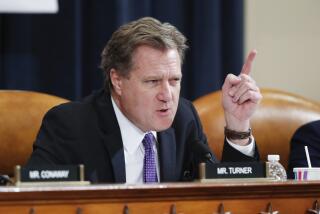An NSA fix
- Share via
Since the disclosure of highly classified National Security Agency programs in June, the nation has engaged in a heated debate over electronic surveillance, particularly as it affects the privacy of the American people. The need to strike a balance between security and privacy is a constant challenge, and it’s the mark of a free society that we debate that balance vigorously and in public.
Perhaps the most controversial revelation in the material leaked by former NSA contractor Edward Snowden is the size and shape of the so-called bulk phone metadata collection program, which was the focus of a House Intelligence Committee hearing Tuesday.
That program in its current form should be brought to an end by the administration.
Under the authority of a provision in the Patriot Act, the Foreign Intelligence Surveillance Court has ordered telecommunications companies to turn over the phone records of nearly every call in the United States to the government. These orders, sought by the Justice Department, must be renewed every 90 days, and the data are stored by the National Security Agency. These records do not contain the names of callers or the calls’ content; they do include phone numbers, times and call durations.
Even though the information retained is limited, critics concerned about the potential for abuse have questioned the efficacy of the program. When evaluating any intelligence-gathering effort, there are three criteria to consider. Does the program comply with our 4th Amendment constitutional protections? Is it an effective tool to protect national security? Is it designed to minimize the effect on the privacy and civil liberties of Americans?
The surveillance court has found the phone metadata program to be constitutional as currently structured, though some legal scholars take issue with that analysis. Although many, myself included, believe the court should be reformed so that the judges must take into account contrary legal analysis when asked to approve such programs, it is not clear that an adversarial process would change the surveillance court’s decision when it comes to collecting phone records. After all, although the public may have a very different view, the Supreme Court has previously held that there is no expectation of privacy for business records such as those obtained by the NSA.
As for the effectiveness of the program, the evidence that it has made us safer is limited. The Obama administration cites about a dozen cases in which the database was consulted in an investigation. Although many of the details of these cases remain classified, evidence that the metadata program was an integral part of the success of each of these investigations — or even most of them — is far from clear. Instead, it appears that the utility of the metadata program has been conflated with the success of other collection efforts.
Finally, on the third test of whether the program has been structured to minimize unnecessary intrusion on our privacy, the NSA program plainly fails. Rather than a narrowly tailored effort that reduces the potential for abuse or violations of privacy, the bulk collection regime is vast, touching billions of phone calls made in the United States over the last five years.
This is all the more troubling because there are other less intrusive ways to structure the program. I have urged the administration — privately at first, then publicly — to reconfigure the NSA effort so that the call records remain with the telephone companies that already hold them for business purposes. Under this model, the government could meet its national security needs by asking the companies to run a number once it had been connected to a suspected terrorist plot. The government would neither collect nor retain the phone records.
At the Tuesday hearing, NSA Director Keith Alexander acknowledged that such a restructuring is technically feasible provided the phone companies maintain the data long enough and in an accessible format. Such a system might be less efficient for the NSA, but it could nonetheless provide quick and timely results. And Americans have the right to expect that intelligence-gathering programs are judged on more than efficiency alone. After all, if efficiency were the only priority, there would be no need for a 4th Amendment.
The bulk collection of America’s telephone records must stop. The administration and the NSA would be wise to restructure it in a way that protects our privacy. If they fail to act, it’s likely that Congress — where legislation already has been introduced — or the courts will do it for them.
Adam B. Schiff (D-Burbank) is a senior member of the House Intelligence Committee.
More to Read
A cure for the common opinion
Get thought-provoking perspectives with our weekly newsletter.
You may occasionally receive promotional content from the Los Angeles Times.









